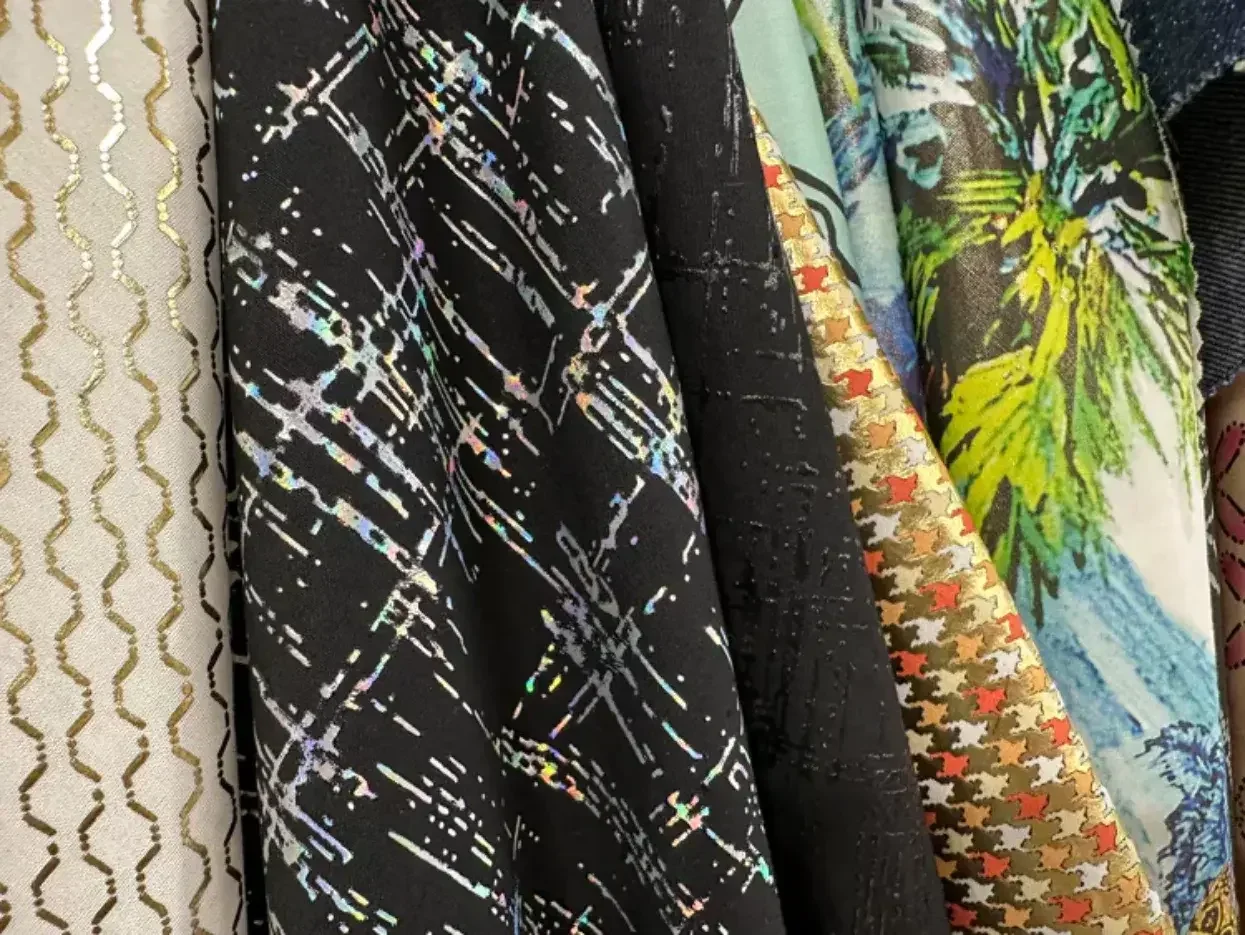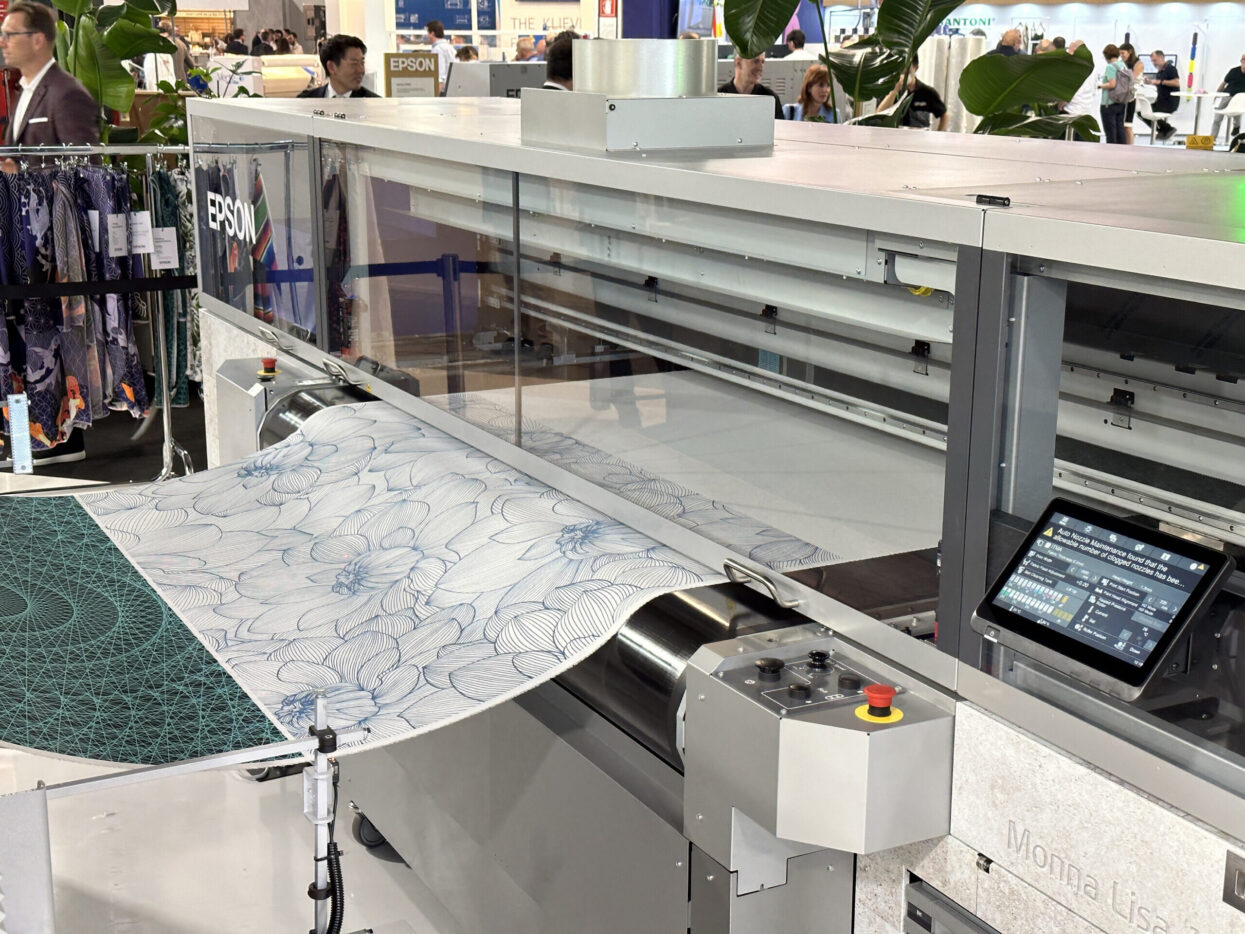
Debbie McKeegan speaks to Francesco Nozza, Business Development Manager at Epson Italia about his insights on the future trends of industrial direct-to-textile printing using digital technologies.
The global textile printing industry stands at the crossroads of technology, sustainability, and consumer demand, it’s a transformative chapter and one that will democratise printed textile distribution and disrupt the traditional print marketplace, forcing systemic change. Listen to the corresponding podcast here.
In a recent conversation, Francesco Nozza, Business Development Manager at Epson Italia, shared his insights on the future of industrial direct-to-textile printing using digital technologies.
As the global economy slows down due to post-pandemic inflation, geo-politics, rising costs and the impact of ongoing global conflicts, textile companies are facing increasing pressure. However, as Nozza underlined, Epson’s focus remains firmly on helping its clients navigate this rapidly evolving landscape and Epson’s product lines zero in on providing solutions that value personalisation, consistent – high quality printed output, and, critically, embedded environmental sustainability on an industrial scale.
In a volatile market, innovation and manufacturing agility are essential. By example: Epson’s new ML 13000 eliminates the need for pre- and post-treatment, while the ML 32,000 JQ can print on Jacquard fabrics with high precision – both machines capture this paradigm. These printers are not only flexible and efficient but also fit perfectly into the circular economy, marking a worldwide shift towards greater sustainability in all production processes.
Epson’s ML, Monna Lisa printing technologies are engineered with cutting-edge technology and primed to meet the diverse needs of modern, industrial textile production. At the heart of these machines is the advanced PrecisionCore printhead technology, renowned for its unparalleled accuracy and speed. The ML 13000 model is designed for medium-sized operations, providing a seamless integration with existing workflows, while delivering high-resolution output and reliable performance. On the other hand, the ML 32000 JQ is tailored for large-scale productions, boasting an impressive
printing speed that ensures high-volume demands are effortlessly met. Both machines are equipped to work with a variety of textiles, from cotton to synthetic fibers, and are meet the industries growing demand for customisation and quick turnaround times.
A key strategy for Epson is the increasing use of their Genesta pigment inks which minimise water usage and critically – reduce waste, whilst aligning with sustainable practices – and importantly reducing the environmental footprint of textile manufacturing. Pigment inks, although not new to the sector, have continued to gain popularity. Known for providing a wide colour gamut and deep, vibrant colours, Genesta inks also meet the industries increasingly strict transparency and sustainability certifications and promise energy savings and cost efficiency – two aspects high on the priority list for any business grappling with the current economic climate.
With a future proof strategy, Epson’s ongoing commitment delivers environmentally conscious products that meet the evolving expectations of an environmentally conscious generation. Through these innovations, Epson continues to position its print technology as a transformative force in the industry, meeting the current and future demands of the textile sector.

As Nozza elaborates on the intricacies of Epson’s innovative approach, he emphasises “the critical role that adaptability plays in today’s rapidly changing market”. Epson’s design philosophy is centered on creating machines that can seamlessly adapt to varied production environments while maintaining high performance levels. The ML 13000 and ML 32000 JQ demonstrate this adaptability with their user-friendly interfaces and scalable production capabilities.
This ensures that regardless of the company’s size, from boutique operations to industrial giants, the integration process is smooth and future-proof. Epson’s Monna Lisa machines are engineered to handle diverse textiles and printing techniques, thereby offering clients the flexibility to explore new markets and meet bespoke customer demands. In focusing on advanced solutions, Epson not only aligns with current environmental directives but also anticipates future regulatory shifts, thus supporting clients in achieving long-term sustainability goals.
Nozza is unequivocal about the fact that Epson’s commitment extends beyond merely meeting industry standards—”it’s about setting new benchmarks in innovation and sustainability”. This forward-thinking strategy not only supports the textile industry’s shift toward a sustainable future but also ensures that Epson remains a leader in technological advancements.
Looking ahead, Nozza emphasised how aligning with customers’ environmental goals is set to be one of the main objectives for Epson in the coming year. “By reducing costs and improving efficiency without compromising on sustainability, Epson is paving the way for the future of the textile industry”.
In conversation Francesco further underscored Epson’s dedication to innovation, technology, and sustainability, “As changes whip through the global economy, businesses within the printing industry must not only weather the storm but also evolve with it. Epson’s vision shines a light on a viable path forward, leading the market by providing advanced solutions that cater to the evolving needs of its customers”.
Epson’s commitment to delivering high-quality, customisable, and eco-friendly solutions highlights the company’s intuitive understanding of the dynamic landscape. “It is this commitment to innovation and sustainable practices that positions Epson as a thought leader and trusted partner in the industry” Francesco stated.
In closing, Nozza’s insights offer a perspective on a resilient industry, ready to adapt and willing to innovate. As the future unfolds, Epson’s unwavering commitment to aligning technology with sustainability will undoubtedly continue to sculpt the evolution of the textile printing industry.
To discover the latest content that covers a wide range of sectors including textile printing and inks sign up for FESPA’s free monthly newsletter FESPA World available in English, Spanish and German.